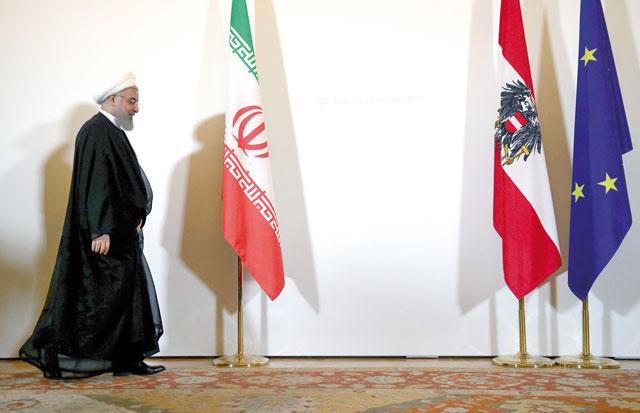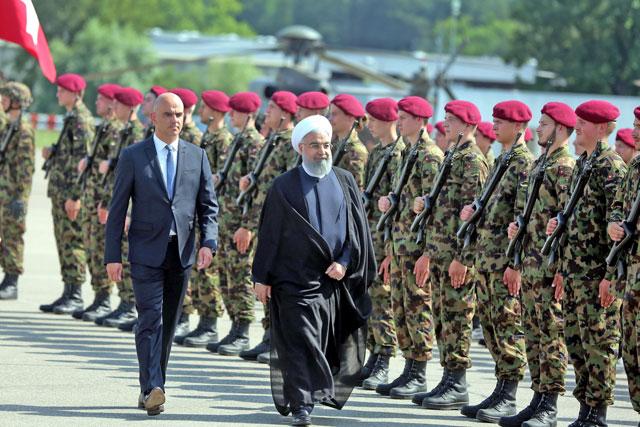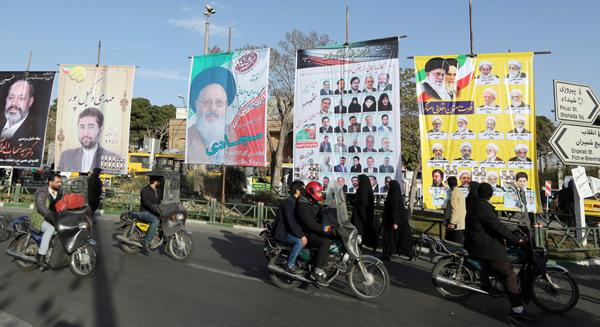You are here
Iran's Rouhani in Vienna to shore up nuclear deal, dogged by diplomat's arrest
By AFP - Jul 05,2018 - Last updated at Jul 05,2018

Iran's President Hassan Rouhani arrives at the Austrian Chancellery in Vienna, Austria, on Wednesday (Reuters photo)
VIENNA — Iranian President Hassan Rouhani on Wednesday was on the second leg of his European tour seeking assurances over the 2015 nuclear deal, a trip clouded by the arrest of a Tehran diplomat over an alleged bomb plot against opposition exiles in Paris.
Hoping to boost economic cooperation to help offset the return of US sanctions following Washington's pullout from the historic deal, Rouhani arrived late on Tuesday in Vienna — the city where it was signed.
"Insofar as it is possible for Iran, we shall remain party to the accord, we shall not quit the JCPOA [the Joint Comprehensive Plan of Action] on condition that we can also benefit from it," Rouhani said.
"If the other signatories, apart from the United States, can guarantee Iran's interests then Iran will stay in the JCPOA," he insisted.
US President Donald Trump unilaterally pulled out of the agreement nearly two months ago, to the ire of the other signatories — China, France, Germany, Britain and Russia — which along with the European Union have continued to back the accord.
"We need a balance between our duties and the hypothesis of restrictions... We hope for decisive actions regarding trade and the economy," added Rouhani in comments sending a message to the other deal signatories, whose foreign ministers are due to meet in Vienna on Friday for the first time since Trump's decision to dump the deal.
Austria just took up the European Union's six-month rotating presidency, while Vienna is the home of the UN nuclear watchdog, the IAEA, which monitors Iran's compliance with the accord.
Rouhani's European trip will be of "prime importance" as it could "provide a more precise picture of cooperation between Iran and Europe", the Iranian foreign ministry spokesman said at the weekend.
The Iranian government has itself warned that it will not continue to abide by the nuclear agreement if doing so goes against its economic interests.
Rouhani, a moderate conservative re-elected in 2017, began meeting President Alexander Van der Bellen on Wednesday, and met Chancellor Sebastian Kurz later in the day.
'False flag ploy
The nuclear deal has been the cornerstone of Rouhani's policy of greater openness with the West, and the US departure has seen him severely criticised by ultra-conservatives at home.
Iran's supreme leader, Ali Khamenei, has demanded Europe provide a number of economic guarantees in order for Tehran to continue its commitment.
Increasing the pressure on Iran's European partners, he ordered preparations be made to quickly restart nuclear activities in case talks collapse.
Rouhani's visit follows reports of the Iranian diplomat's arrest along with five others over a purported foiled attack on a rally of thousands of Iranian opposition supporters in Paris.
Rouhani has not changed his programme over what his foreign minister dismissed as a "false flag ploy" designed as a distraction.
"How convenient: Just as we embark on a presidential visit to Europe, an alleged Iranian operation and its 'plotters' arrested," Mohammad Javad Zarif Tweeted.
Just hours before welcoming Rouhani to Austria, Vienna summoned Iran's ambassador and announced that the unnamed diplomat's status would be withdrawn.
The diplomat attached to the Iranian embassy in Austria, who was detained in Germany, was believed to be a contact of a couple at the centre of the alleged plot.
He may soon be extradited to Belgium, which is spearheading a probe into the alleged bomb plot, prosecutors told the German news agency DPA.
"We are waiting for full clarification" on the case, Kurz said at a press conference alongside Rouhani.
Zarif, who is accompanying Rouhani, will on Friday meet top envoys from the five powers for the first time since Washington's withdrawal.
Kurz had said he would speak plainly with Rouhani about Iran's role in the Middle East, as Tehran continues to deny accusations it is destabilising the region.
The Austrian chancellor said he considered it "absolutely unacceptable" to question the right of Israel to exist or call for the state's destruction.
Related Articles
VIENNA — Iranian President Hassan Rouhani's visit to Switzerland and Austria was shaken on Tuesday by allegations that one of Tehran's diplo
VIENNA — Iranian President Hassan Rouhani postponed a two-day visit to Austria indefinitely for security reasons on Tuesday, the evening he
TEHRAN — Iran's top leader warned voters on Wednesday the West was plotting to influence elections pitting centrists close to President Hass













